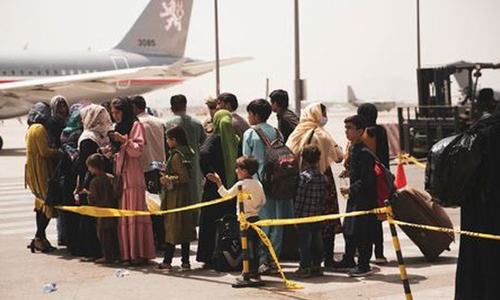
PESHAWAR: The National Database and Registration Authority (Nadra) has updated details of over half million registered Afghan refugees as part of the countrywide campaign to issue renewed Proof of Registration (PoR) cards.
The United Nations High Commissioner for Refugees (UNHCR) said in a statement here on Tuesday that some 1.4 million registered Afghan refugees were being verified and issued with new biometric cards through 35 sites and four mobile units.
UNHCR Regional Director for Asia and the Pacific Indrika Ratwatte visited a DRIVE Centre in Peshawar and was briefed on the process, according to the statement.
The last large-scale verification of Afghan refugees in the country known as Documentation Renewal and Information Verification Exercise (DRIVE) was undertaken 10 years ago.
Nadra has updated details of over 500,000 registered refugees so far
The statement said that Commissionerate for Afghan Refugees with the support of the UN refugee agency was carrying out the drive which was likely to be completed within the year.
“I applaud the progress Pakistan has made with this exercise. It is a global leader in terms of developing a high-tech refugee registration platform which enables refugee protection and solutions,” the statement quoted Mr Ratwatte as saying.
“I hope more countries will follow in Pakistan’s footsteps in providing documentation to refugees,” he said.
Nadra has printed and distributed some 100,000 new smartcards to registered Afghan refugees. Khyber Pakhtunkhwa is currently hosting the largest number of registered refugees living in urban areas and refugee villages.
“A lot has changed since the last large-scale exercise in Pakistan 10 years ago. The refugee smartcards are an important tool of protection, and it enables the government and UNHCR to have current information on the refugee population, including vulnerabilities, skills and education levels to better inform the provision of services and assistance,” Mr Ratwatte added.
The smart PoR cards, which will be valid until June 2023, are legally recognised proof of identity and include enhanced security features. These cards are also technologically compatible with systems used in Pakistan to authenticate the identities of nationals to access services.
The UN agency said that the DRIVE was also part of a wider effort to seek solutions for Afghan refugees, particularly through the Support Platform for the Solutions Strategy for Afghan Refugees. The exercise will help collect data on educational and professional backgrounds of the refugees.
It said that measures were in place at all DRIVE sites to mitigate Covid-19 risks through enhanced hygiene, physical distancing, and the scheduling of set numbers of appointments each day.
Published in Dawn, September 22nd, 2021












































